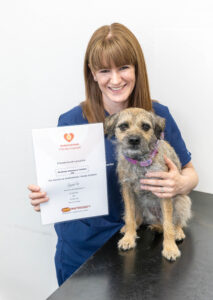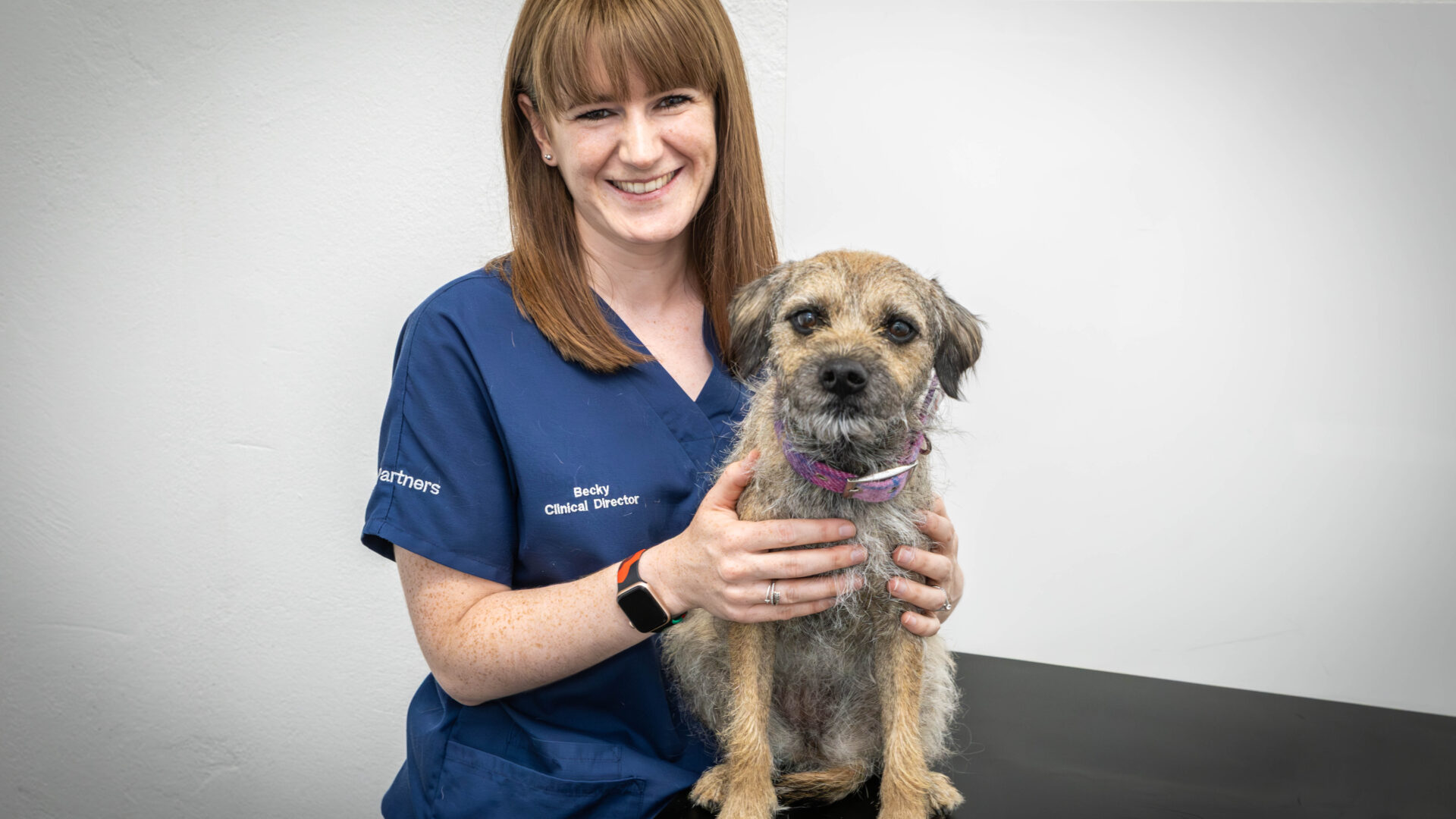Vet Becky Richardson is using her experience of living with the pain of endometriosis to campaign for better support for other women suffering from the often-debilitating condition.
Endometriosis is a condition where tissue similar to the inner lining of the uterus grows outside the uterus, often causing pain ranging from mild to severe, and can be debilitating for many sufferers. One in 10 women in the UK are affected – that’s more than 1.5 million.
VetPartners is committed to supporting women with endometriosis and has developed an Endometriosis Policy in collaboration with colleagues who live with the condition.
Becky, who is Clinical Director at Westway Vets in Newcastle, is now raising awareness of the condition and her practice has become an Endometriosis Friendly Employer to help tackle the stigma surrounding the condition.
Here, she talks about the challenges of living with a long-term, chronic condition and how endometriosis can have an impact on every aspect of a person’s life….
I began to experience signs of endometriosis at 16 years old, but it was only 20 years later, earlier this year, that I was formally diagnosed with endometriosis following specialist surgery to excise endometrial tissue from my ovaries, uterus and bladder.
Endometriosis is a complex and poorly understood condition which affects sufferers in very different ways. Personally, my most difficult symptom has always been heavy periods which cause me sudden and debilitating pain. I also regularly experience backache, hot-flushes, headaches and dizziness.
Managing my symptoms has involved a combination of surgery and various hormone and painkiller drugs. I have also found that yoga has particularly helped me as has giving up alcohol and reducing caffeine. There is no ‘one size fits all’ management plan for endometriosis and what helps one individual may be very different to what helps another.
My path to diagnosis has been frustrating and it’s taken decades for me to feel that my concerns have been listened to. Often, I have felt misunderstood. Several years ago, I had to attend A&E after a cyst on my left ovary twisted and burst causing me severe abdominal pain.
Working full time in a demanding role
Following this incident, my GP referred me to a specialist clinic for further investigations. After waiting almost 2-years to see the specialist team, the doctor I saw would not perform any further tests, telling me to ‘get back in touch if I got worse’. I was told that, because I was managing to work full time in a demanding job, my symptoms weren’t considered severe enough for further investigations! My husband, who is an intensive care doctor, came with me to the appointment and was shocked to experience just how hard it can be to have the symptoms of endometriosis taken seriously.
A combination of long gynaecology waiting lists and limited knowledge of the condition, even amongst medical professionals, can leave women feeling dismissed, isolated and desperate. I was lucky that after doing my own research, I found a fantastic endometriosis specialist in Edinburgh who took my worries seriously and quickly arranged for me to have an MRI and surgery. I was relieved to find someone who gave me an explanation for how I had been feeling and who was so kind and understanding. I only wish I’d found him years earlier and that I hadn’t had to push so hard for answers.
Sadly, my experience is not unique, and many women will have similar stories. Endometriosis UK’s 2024 Diagnosis Report found that the average time to diagnosis in the UK is 8 years and 10 months and that 47% of those surveyed had to attend 10 or more GP appointments with symptoms prior to a diagnosis.
We’re ending the stigma around endometriosis
I firmly believe that, because endometriosis is a women’s health condition, specifically one involving menstrual health, it is still considered taboo. It’s an invisible disease without a cure and often its impact on health and wellbeing is dramatically underestimated. Recent media spotlight on the condition has meant that awareness is improving, but there is still a lot of misinformation circulating and wider education is needed.
Working as a Vet with endometriosis has had its particular challenges. For several days each month, I suffer from significant pain and bleeding which causes me to feel nauseous and faint. I’m glad if these days fall when I am off work, otherwise, I know that the working day will be difficult especially if it involves long periods in surgery.
Having such a fast-paced, physical job can be hard, and I often put pressure on myself to ‘push on’ regardless of how I am feeling. When I was a new graduate working for an all-male leadership team, I felt too embarrassed to share my experience and I wasn’t confident enough to advocate for myself the way I should have done. Nowadays, I am more likely to speak up and ensure I take care of myself, and I recognise that doing this is an important part of building an open practice culture where people feel able to ask for help.
 Now that I am a practice leader myself, I would like to use my platform to raise awareness of endometriosis in our workplace and ensure that the whole team is as educated as possible. Sharing my own experiences with my colleagues has opened up so many conversations within our practice, many of them unexpected.
Now that I am a practice leader myself, I would like to use my platform to raise awareness of endometriosis in our workplace and ensure that the whole team is as educated as possible. Sharing my own experiences with my colleagues has opened up so many conversations within our practice, many of them unexpected.
These conversations are essential to destigmatising endometriosis and other women’s health conditions such as adenomyosis, fibroids and polycystic ovarian syndrome. My long-term aim is to help as many members of the veterinary profession as possible to feel that they can speak openly about women’s health and to help leaders to know how to signpost their employees to the correct support.
I am very proud that this year, Westway Veterinary Group became an Endometriosis Friendly Employer. As members of this scheme, run by Endometriosis UK, we are working to build a culture where any colleague with suspected, or diagnosed, endometriosis feels comfortable having conversations with either their line manager or one of our Endometriosis Champions.
These conversations will allow reasonable adjustments and flexibility to be offered and will help colleagues to know that they are supported. Through the scheme, our leaders will be provided with the information and guidance they need to support someone with endometriosis at work. The practice has nominated 10 Endometriosis Champions who will work to raise awareness of endometriosis and actively tackle the stigma that surrounds it. I have been overwhelmed by the number of colleagues keen to get involved in this initiative and I think this shows that despite all the work being done around Women’s health in the workplace, there is plenty more to be achieved.
Becky Richardson is a small animal vet and Clinical Director at Westway Veterinary Group, which has practices across the North East of England. She has worked at Westway for 13 years. Becky qualified from Edinburgh Vet School in 2012 and completed her RCVS Certificate of Advanced Veterinary Practice in Small Animal Medicine in 2021.
